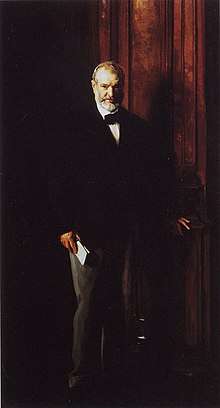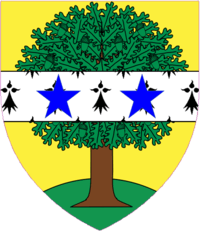William Watson, Baron Watson
Not to be confused with William Watson, Baron Thankerton
The Lord Watson | |
|---|---|
 | |
| Lord Advocate | |
| In office 1876–1880 | |
| Monarch | Queen Victoria |
| Prime Minister | Benjamin Disraeli |
| Deputy | John Macdonald, as Solicitor General for Scotland |
| Preceded by | Edward Gordon |
| Succeeded by | John McLaren |
| Solicitor General for Scotland | |
| In office 1874–1876 | |
| Monarch | Queen Victoria |
| Prime Minister | Benjamin Disraeli |
| Preceded by | John Millar |
| Succeeded by | John Macdonald |
| Member of Parliament for Glasgow and Aberdeen Universities | |
| In office 1876–1880 | |
| Preceded by | Edward Gordon |
| Succeeded by | James Alexander Campbell |
| Personal details | |
| Born | 25 August 1828 Covington, Lanarkshire |
| Died | 14 September 1899 (aged 71) |
| Political party | Conservative |
| Spouse(s) | Margaret Bannatyne |
| Residence | 20 Queen's Gate, South Kensington |
| Alma mater | University of Glasgow, University of Edinburgh |
| Profession | Advocate |
William Watson, Baron Watson, PC (25 August 1827 – 14 September 1899)[1][2] was a Scottish lawyer and Conservative Party politician. He was Lord Advocate, the most senior Law Officer in Scotland, from 1876 to 1880, and was then appointed a Lord of Appeal in Ordinary.
Early life
Watson was born in Covington, Lanarkshire on 25 August 1827. He was the eldest son and second of the six children of Eleonora and Reverend Thomas Watson. He was educated privately and studied law at the universities of Glasgow and Edinburgh.[1] He was admitted to the Faculty of Advocates in 1851[1] and appeared for the defence of Dr Edward William Pritchard, the poisoner, in 1865.[3]
Career
Watson was appointed Solicitor General for Scotland, one of the Scottish Law Officers and deputy to the Lord Advocate, in 1874,[4] and was elected Dean of the Faculty of Advocates in 1875.[1] In 1876, the Lord Advocate, Edward Gordon, was appointed a Lord of Appeal in Ordinary (Lord Gordon of Drumearn) and resigned as Lord Advocate and Member of Parliament (MP) for Glasgow and Aberdeen Universities. Watson won the ensuing by-election[5] and was appointed Lord Advocate.[6] He was appointed a Privy Counsellor in 1878.[7]
Watson did not stand for re-election at the 1880 general election,[5] and was instead appointed a Lord of Appeal in Ordinary[8] as Baron Watson, of Thankerton in the County of Lanark.[8] As a member of the Privy Council, he was also entitled to sit on the Judicial Committee of the Privy Council.
Judgements
- Foakes v Beer [1884] UKHL 1, [1881-85] All ER Rep 106, (1884) 9 App Cas 605; 54 LJQB 130; 51 LT 833; 33 WR 233 - a leading case from the House of Lords on the legal concept of consideration
- Liquidators of the Maritime Bank of Canada v. Receiver-General of New Brunswick [1892] A.C. 437 - statement of provincial powers under the BNA Act 1867
Personal life
Watson married Margaret Bannatyne (1846-1898) in 1868, and the couple had five sons and a daughter. His son William also became a law lord as Lord Thankerton. Watson lived at 20 Queen's Gate in South Kensington, and was a member of the Athenæum and the Carlton Club.[1]
He is buried in Dean Cemetery in Edinburgh against the north wall, of the Victorian north extension, near the north-west corner.
  |
|
References
- "William Watson, Baron Watson". Who's Who. Retrieved 20 January 2011.
- Leigh Rayment's Historical List of MPs – Constituencies beginning with "G" (part 1)
- Rigg, J.M.; Gordon, W.M. (2004). Watson, William (Online ed.). Oxford University Press. doi:10.1093/ref:odnb/28876.
- London Gazette 24 July 1874
- Craig, F. W. S. (1989) [1977]. British parliamentary election results 1832–1885 (2nd ed.). Chichester: Parliamentary Research Services. p. 616. ISBN 0-900178-26-4.
- London Gazette 13 October 1876
- London Gazette 2 April 1878.
- London Gazette 27 April 1880
- Burke's Peerage. 1886.
External links
- Hansard 1803–2005: contributions in Parliament by William Watson
| Parliament of the United Kingdom | ||
|---|---|---|
| Preceded by Edward Gordon |
Member of Parliament for Glasgow and Aberdeen Universities 1876–1880 |
Succeeded by James Alexander Campbell |
| Legal offices | ||
| Preceded by John Millar |
Solicitor General for Scotland 1874–1876 |
Succeeded by John Macdonald |
| Preceded by Edward Gordon |
Lord Advocate 1876–1880 |
Succeeded by John McLaren |